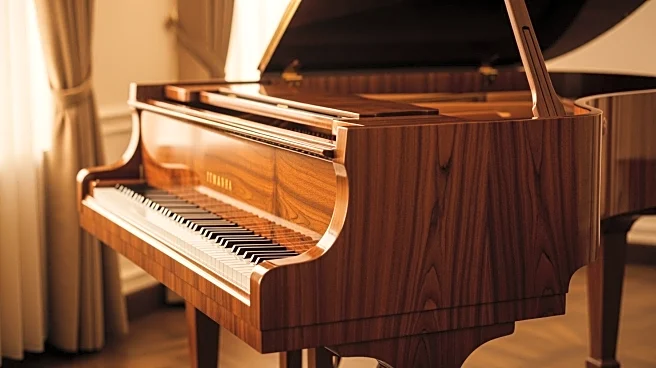What's Happening?
Steinway & Sons, a 150-year-old piano manufacturer based in Astoria, New York, continues to thrive in the challenging U.S. manufacturing landscape. The company employs around 200 skilled workers who handcraft pianos, a process that takes approximately
11 months per instrument. Unlike many manufacturers that compete on price, Steinway focuses on quality, allowing it to charge premium prices for its world-class pianos, which can range from $90,000 to $200,000. This approach has enabled Steinway to maintain its operations in New York City despite high costs and strict regulations. The company sources many of its components domestically, minimizing the impact of tariffs imposed during President Trump's trade policies.
Why It's Important?
Steinway & Sons serves as a rare example of successful U.S. manufacturing by prioritizing quality over mass production. This strategy allows the company to cater to high-end market segments that value premium craftsmanship. In a broader context, Steinway's success highlights the potential for niche manufacturing sectors to thrive despite the challenges posed by tariffs and global competition. The company's ability to maintain a skilled workforce and source materials domestically underscores the importance of specialized skills and local supply chains in sustaining U.S. manufacturing. As many manufacturers struggle with the effects of tariffs and automation, Steinway's model offers insights into how traditional craftsmanship can coexist with modern economic pressures.
What's Next?
Steinway & Sons faces ongoing challenges, including a potential shortage of Sitka spruce lumber, essential for crafting high-quality pianos. The company must also ensure a steady supply of skilled workers to continue its legacy of craftsmanship. As the manufacturing landscape evolves with increasing automation, Steinway's commitment to handcrafting may serve as a blueprint for other niche manufacturers seeking to differentiate themselves through quality and tradition. The company's future will likely depend on its ability to adapt to resource constraints while maintaining its reputation for excellence.
Beyond the Headlines
Steinway & Sons' success story raises questions about the sustainability of traditional manufacturing methods in an era dominated by automation and global supply chains. The company's reliance on skilled labor and domestic sourcing challenges the prevailing trend of offshoring and mass production. This approach not only preserves jobs but also maintains cultural and historical craftsmanship that might otherwise be lost. Steinway's model could inspire other industries to explore similar strategies, emphasizing the value of quality and heritage in a rapidly changing economic environment.
















